Israel and Palestinians: Factory attack political protesters jailed
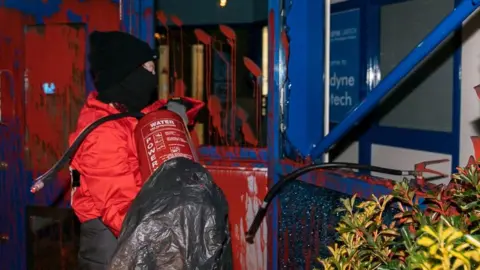 Vladimir Morozov
Vladimir MorozovPro-Palestinian protesters who caused hundreds of thousands of pounds of damage to an electronics plant they believed was making circuit boards for Israeli drones have been jailed.
Teledyne Labtech, in Presteigne, Powys was targeted in December 2022.
Activists in red suits and balaclavas smashed windows, daubed red paint on walls and drilled holes in the roof.
They also used crowbars to destroy office equipment and they also covered a memorial to a staff member in paint.
Susan Bagshaw, 55, of Comins Coch, Ceredigion, Morwenna Grey, 42, of Machynlleth, Powys, Tristan Dixon, 34, of Huddersfield, pleaded guilty to conspiracy to commit criminal damage.
Ruth Hogg, 40, of Aberystwyth, Ceredigion, was found guilty of the same charge after a trial in Caernarfon in May.
Hogg was jailed for 27 months, while the other three were sentenced to 23 months each at Mold Crown Court on Monday.
Judge Rhys Rowlands told the court the group caused "wanton damage" at the factory.
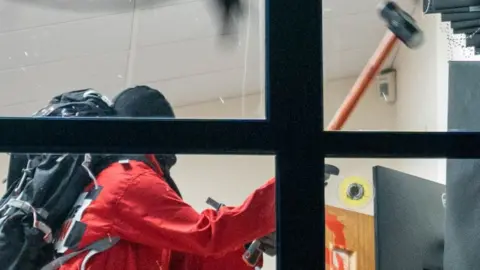 Vladimir Morozov
Vladimir MorozovIt heard workers were in the canteen on the morning of 9 December when they heard breaking glass, as Bagshaw and Grey broke windows to get in.
Once inside, the two women, wearing boiler suits and balaclavas, smashed computer screens, sprayed paint on the walls and floors, and set off smoke bombs.
Hogg and Dixon were then found drilling and sawing on the roof and smashing skylights.
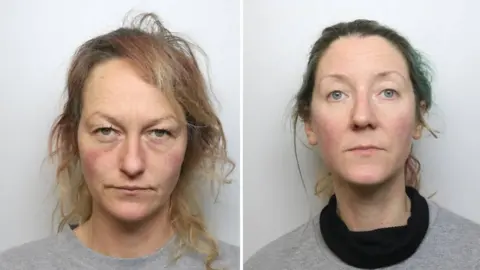 Dyfed Powys Police
Dyfed Powys PoliceA banner in support of Palestine was unfurled across the side of the factory.
Elen Owen, prosecuting, told the court there was evidence of planning and premeditation by the group.
She said they caused fear and distress to staff adding that one said he feared for his life.
The combined cost of the damage and consequential costs such as security measures, totalled about £1.2m she said.
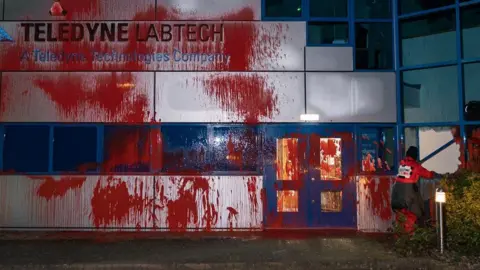 Vladimir Morozov
Vladimir MorozovThe factory, which employed 64 people at the time, was closed for about three weeks for the clean-up and repairs.
In a victim impact statement, the firm's general manager, Adele MacLachlan, said there was anger about "misinformation" surrounding what Teledyne Labtech manufactured.
It made, she said, circuit boards for applications, like inflight entertainment antennae, MRI scanners and radar.
Judge Rowlands said though they believed the company was involved in the manufacture of arms used by Israel against Palestinians, there were no security fences or guards at the factory, which made it "a very unlikely candidate for ties with arms industry".
He said the group carried out "a sea of vandalism" and a "significant" degree of costly damage.
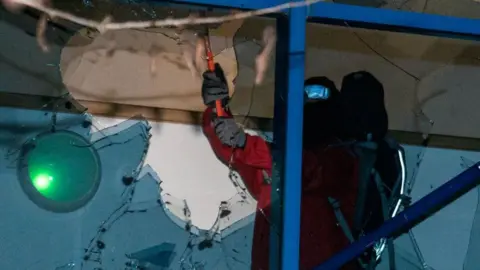 Vladimir Morozov
Vladimir MorozovHe also said: "There was a high degree of planning and premeditation and intention to cause a high degree of damage."
There were a number of aggravating features to the case, he said, including that it was a group action which posed a risk to others, and workers and the emergency services were inconvenienced.
He accepted all four had shown a degree of remorse for their actions and had said in letters to the court that they would not carry out such action again.
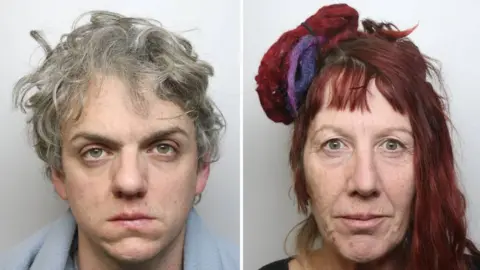 Dyfed Powys Police
Dyfed Powys PoliceBut he said contrition in Hogg's case was "hollow" given that she pleaded not guilty.
He said the action they took was "very far from the generality of direct action cases… it involved extreme behaviour and violence."
"Your intention was to put the factory out of action for as long as you could."
